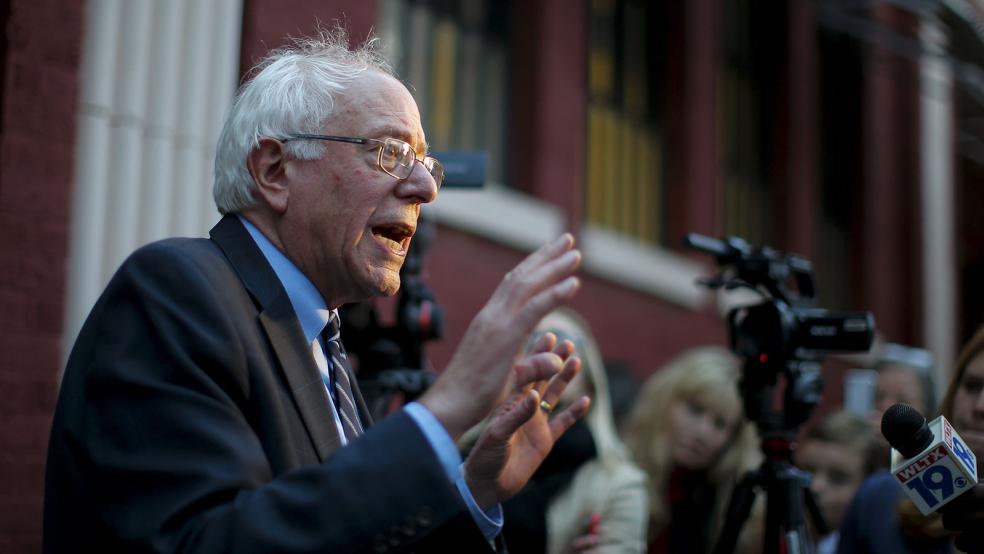While the 2016 presidential campaign debate has shifted sharply to concerns about national security in the wake of the ISIS terrorist attacks in Paris, Sen. Bernie Sanders of Vermont has struck many as oddly tone deaf as he struggles to overtake Hillary Clinton for the Democratic nomination.
Sanders was criticized by many pundits for pivoting too quickly in his opening remarks during the second Democratic debate on Nov. 14 from expressing shock and disgust over the attacks that killed 130 people to his signature campaign issue of fixing an economy that has been rigged by a billionaire class against average middle class Americans.
Related: Bernie Sanders Wants a New NATO, Including Russia, to Fight ISIS
Since then, he has done little to broaden his campaign stump speeches to include his views on foreign policy and battling ISIS, even as Clinton, Republican presidential frontrunner Donald Trump and other GOP candidates escalate their rhetoric to promise tough, unflinching leadership in the war on terrorism. During a four-day swing through Georgia and South Carolina that ended Monday, Sanders said little about combatting ISIS unless specifically asked by reporters or members of the audience, according to The Washington Post.
When he does volunteer his views on the global terrorism crisis, it’s usually to say that the U.S. should participate in but not lead the military campaign in Syria and Iraq. “It is absolutely imperative that foreign policy and how we most effectively destroy ISIS become part of the campaign,” Sanders told John Wagner of The Washington Post. “That’s absolutely right. But obviously the fact that the middle class of our country continues to disappear, we have massive levels of wealth and income inequality, and we have a corrupt campaign finance system, that does not disappear because of the ISIS attacks. I will continue talking about those issues as well.”
There’s no question that income inequality and the evils of Wall Street are topics that helped the 74-year-old Sander’s once improbable campaign soar to national prominence last summer. Clinton struggled to overcome major controversies over her use of a private email server during her four years heading the State Department and the tens of millions of dollars that she and her husband raked in giving speeches. Sanders, meanwhile, drew large crowds, raised huge sums of campaign funds and climbed in the polls with his unvarnished rhetoric that stirred young people and the Democratic liberal base.
But Clinton rode out the worst of the storm and now she is back to holding a commanding lead over Sanders and former Maryland governor Martin O’Malley in the race for the Democratic nomination.
Related: Petraeus Warns: No U.S. Ground Troops in Syria
A new Quinnipiac University poll released on Wednesday shows Clinton leading in Iowa among likely Democratic caucus goers with 51 percent to 42 percent for Sanders and three percent for O’Malley. While Iowa Democrats give Sanders a slight edge over Clinton on the question of who would be a better steward of the economy, 73 percent say that Clinton would do the best job of overseeing foreign policy and combating terrorism, compared to just 23 percent for Sanders.
And while Sanders can’t be blamed for clinging to campaign themes that worked so well for him earlier, he is dangerously close to being written off as a Johnny One Note on the economy, one who lacks the experience or depth of knowledge of defense and foreign policy issues to qualify as the country’s next commander in chief.
Part of Sanders’ problem at a time of mounting public fear and concern about terrorism is that he has traditionally opposed U.S. military intervention – as he did as a member of the House in voting against the Bush administration’s decision to go to war against Iraq in October 2002. Clinton voted in favor of the Iraq war as a member of the Senate from New York, but she later said that she made a mistake.
Sanders has frequently reminded audiences that he made the far better decision in opposing a war that has led to many of the current problems in the Middle East, including the rise of ISIS. Yet Clinton is in a better position to argue that she would be a stronger president than Sanders in fighting terrorists in the Middle East and around the world.
Related: Wall Street Has Given Hillary Clinton $29 Million. What Does She Owe Them?
“He is by nature a pacifist and someone for whom resorting to military action is something to be avoided at all cost,” Ross Baker, a Rutgers University political professor, said in an interview on Wednesday. “And I think he’s being very principled in the sense that he doesn’t want to depart radically from his core beliefs. And one of his core beliefs is that you resort to diplomacy and you don’t wave a big stick.”
On Tuesday, while Trump, Sen. Ted Cruz of Texas and other Republican presidential candidates continued to whip up the public against allowing Syrian refugees into the country for fear that terrorists might slip through, Sanders unveiled a detailed immigration plan that would protect 9 million illegal immigrants in this country from being deported. In contrast to the Republicans’ often xenophobic, anti-immigrant rhetoric, Sanders promised a “humane” immigration system that would expand efforts to give the children of undocumented immigrants’ legal status.
“I think he truly wants to be authentic,” Baker said of Sanders. “I think he’s probably unique among all the candidates in his steadfastness to adhere to positions that he has taken traditionally. It’s really quite interesting because, you know, there have been so many in-course corrections by some of these candidates recanting positions they’ve taken before, like Gov. Chris Christie on gun control or Trump on any number of things. This is a guy who is a truly principled man – which is a serious handicap in this race.”





